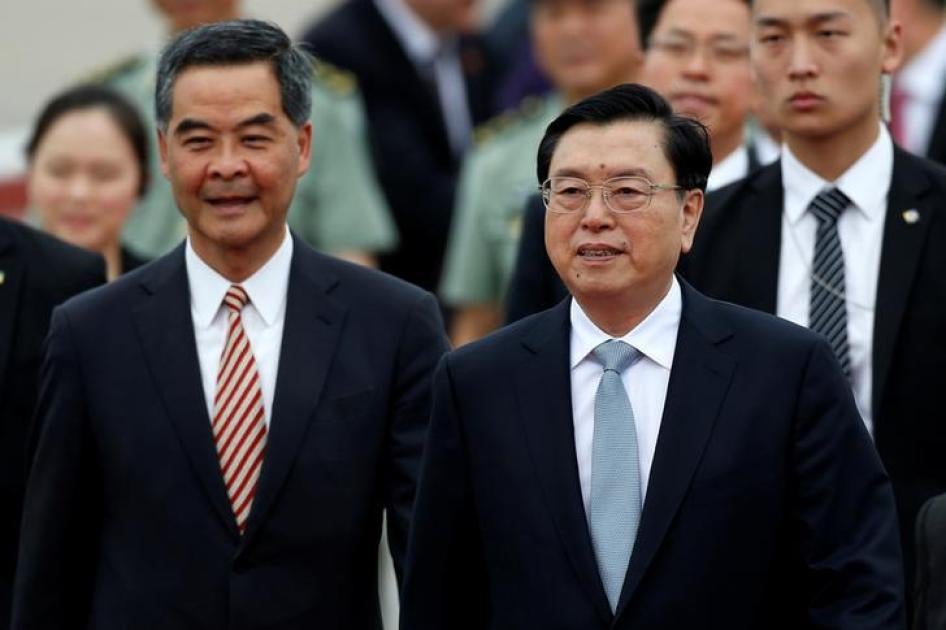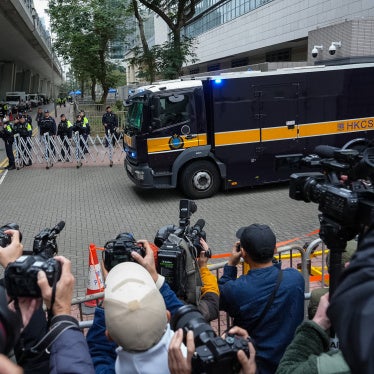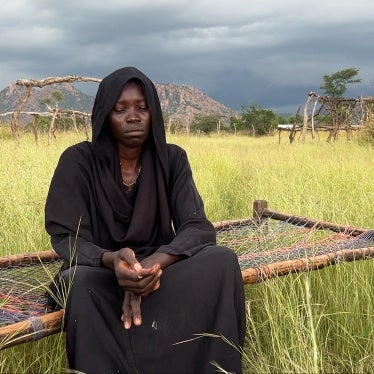(New York) – Hong Kong officials should challenge the chairman of China’s top legislative body to make concrete commitments to respect Hong Kong’s autonomy on human rights and democratic rule, Human Rights Watch said today. Zhang Dejiang, who chairs the Standing Committee of the National People’s Congress, will meet with Hong Kong Chief Executive C.Y. Leung and other senior officials during his visit to Hong Kong from May 17-19, 2016.
Under the 1984 Sino-British Joint Declaration, which spells out the terms for transfer of Hong Kong from British to Chinese rule, Hong Kong is to retain a “high degree of autonomy” in all areas except foreign affairs and defense.
However, China’s central government has increasingly encroached on Hong Kong’s autonomy in recent years, including thwarting popular efforts to achieve universal suffrage, as guaranteed by the Basic Law, Human Rights Watch said. Zhang presided over the August 31, 2014 National People’s Congress decision to impose a stringent screening mechanism that effectively bars candidates the central government disapproves from nomination for Hong Kong’s top official post, the chief executive. That decision set off the “Umbrella Movement,” in which pro-democracy protesters in Hong Kong blocked major thoroughfares for months in 2014. Rather than press Beijing to respect Hong Kong people’s rights to freely elect and run for chief executive, Hong Kong authorities have offered the same failed proposal. At the same time, Hong Kong authorities have brought politically motivated charges against student leaders responsible for organizing the peaceful movement.
Concerns in Hong Kong have also grown about the role of mainland police and other security forces operating in the territory, Human Rights Watch said. In 2015, Chinese authorities forcibly disappeared five booksellers affiliated with the Hong Kong-based Mighty Current Media, known for publishing books critical of senior Chinese leaders. One of the five, Lee Po, was believed to have been taken into custody from Hong Kong on December 30, 2015, and brought to mainland China. Although Lee and two other booksellers later resurfaced, in Hong Kong to cancel missing persons reports their families had filed with the police, they promptly returned to China, raising concerns of continuing detention without charge. Although the Hong Kong government had vowed to follow up on the case, there have been no conclusive answers from Hong Kong authorities regarding Lee’s abduction, nor the fate of the other four.
Hong Kong’s longstanding commitment to an independent and critical media has also increasingly been in question. In April, Keung Kwok-yuen, the chief editor of prominent newspaper Ming Pao who has been credited for confronting political pressure and upholding editorial independence, was abruptly fired. In 2016, the mainland Chinese e-commerce giant Alibaba took over the 112-year-old English-language South China Morning Post, and a top Alibaba executive stated an intention to present a more positive image of China.
The right to organize political parties – long cherished in Hong Kong but prohibited in China – is being challenged, Human Rights Watch said. In April, Hong Kong’s secretary of justice singled out the newly established Hong Kong National Party for investigation, saying that its and other groups’ pro-independence stance “is totally contrary to the Basic Law,” despite the constitution’s explicit protections for Hong Kong people’s basic rights and freedoms.
Human Rights Watch urged Chief Executive Leung to restart the political reform process by informing Zhang of Hong Kong’s intention to submit a report to Beijing justifying the need for greater democratization. Leung should also publicly call on Zhang to provide information about the five booksellers, commit to a thorough investigation into allegations regarding the operations of mainland security forces in Hong Kong, and cease interference in publishing and media freedoms in the territory. Zhang should recommit the central government to upholding its obligations under the Joint Declaration and Basic Law, as well as the International Covenant on Civil and Political Rights and other human rights treaties that apply in Hong Kong.
“Zhang’s visit may say more about the chief executive’s intentions to fight for Hong Kong’s rights than it does about Beijing’s willingness to respect them,” Richardson said. “One way for Zhang and the central government to reduce mistrust in Hong Kong is by publicly answering people’s concerns and pledging to uphold Hong Kong’s autonomy.”







